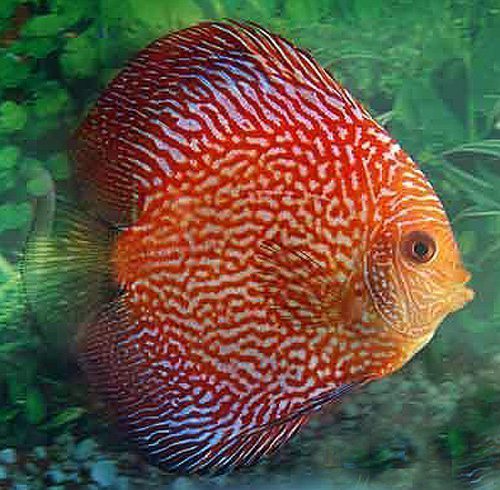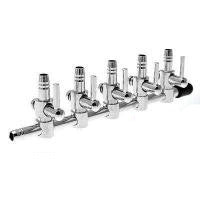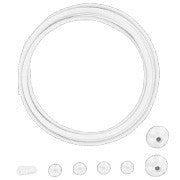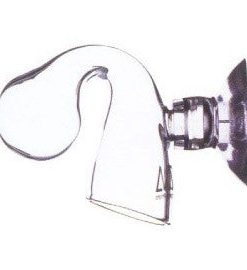Assorted Discus (Symphysodon aequifasciatus) FNM
$ 16,00 $ 9,60
Discus, dubbed the “Kings of the Aquarium” for their regal beauty and array of vibrant hues, are members of the Cichlidae family. Three kinds have been identified, though scientists remain divided on a few scientific titles. Wild-caught specimens can be a challenge to maintain, requiring specific water chemistry and nutrition. Most commercially sold discus are captive-bred, making them less of an undertaking. However, they’re still not ideal for the aquarium novice. Through selective breeding, an abundance of color forms has emerged, with more budding each day.
Water requirements:
Warm, soft, acidic water is what discus prefer—the pH should be between 6 and 7, with hardness at 1-4 dKH (18-70 ppm). As for temperature, keep it between 27-30° C; Use an Aquarium Heater to hit the right spot, and for the best conditions, use dechlorinated tap water or reverse osmosis/deionized water. When you buy discus, find out their water-chem history. As these slippery swimmers need spotless water, 10-25% weekly water changes with an Aquarium Water Changer/Siphon Vacuum Gravel Cleaner are a must. Oh, and remember to treat tap water with Water Conditioner before refilling the tank!
Housing:
Discus can reach serious sizes, so when full-grown, they’ll need an aquarium of 75 gallons or more. Tall tanks are ideal for their body shape, while water movement should be mellow and decorations should include big broadleaf plants and driftwood set up vertically, like trees and branches that have fallen. A few floating plants tossed in will give them shaded spots and cover, and the floor should be made of sand or fine to medium grade, smooth-pebbled gravel–ideal for foraging for food.
Behaviour:
Discus are mellow, easy-breezy fish, but as cichlids, they can get cranky with each other in the pursuit of the perfect companion. Pragmatic aquarists should take out any timid fish that can’t measure up. Mixing discus with a lot of other critters isn’t a great idea. Instead, try cardinal tetras, neons, emperors and rummies, clowns, and some smaller cichlids such as rams and Apistogrammas—all of which can handle the heat and acidic pH that Discus need.
Feeding:
Discus have hearty appetites and can be quite the scavengers, ranging from plant matter and detritus to worms and small crustaceans. When it comes to food, variety is the spice of life! Offer Aqueon Tropical Flakes, Color Flakes, Spirulina flakes, Tropical Granules, Algae Rounds and Shrimp Pellets as staples, and supplement with occasional treats of frozen and live foods. Though some hobbyists and breeders feed beef heart, it’s best to keep to a natural menu for your discus. For satisfactory results, give them a variety of foodstuffs to choose from daily, but nothing more than they can consume in a few minutes – feed once or twice each day.
Breeding:
Add that extra bit of color and challenge to your aquarium with an Assorted Discus (Symphysodon aequifasciatus). These captively bred fish come with a twist – their pairing up and spawning process is considered to be difficult! But the rewards of young, ‘mucus-fed’ babies who go through the parents’ ‘parental shuttle’ service, make the challenge worth it. So, are you up for it?
Purchase Size: approx 2-3″
* All Livestock is for Sale in Singapore only and and Not Available for overseas export.
If stated as “Pre-Order”:
Unless otherwise stated of availability in-store/online, pre-ordering lead time for livestock typically takes approximately 3-4 weeks for shipment arrival + 1 week of quarantine period before ready for delivery/collection. Once a pre-order has been received, any cancellation/amendment request will be subjected to a 5% admin fee charge of the order value. A full refund maybe requested without any cancellation charge imposed if the pre-ordered livestock fails to arrive after 30 days upon placing the order.
Fast Shipping and Professional Packaging
We can offer a variety of shipping options thanks to our long-term relationship with UPS FedEx DHL. Our warehouse staff will package all goods to our exacting requirements. Prior to shipping, your goods will be thoroughly examined and securely secured. We deliver to thousands of customers every day from all over the world. This is a sign of our determination to be the largest online retailer in the world. Warehouses and distribution centers are located throughout Europe as well as in the USA.
Note: Orders that contain more than one item will be assigned a separate processing time for each item.
Prior to shipment, we examine the items ordered thoroughly before sending the items. Most orders are shipped within 48 hours. The expected delivery time is 3 to 7 days.
Returns
The stock is constantly changing and cannot be fully controlled by us due to the involvement of many different parties, such as the factory and our warehouse. The levels of stock can change at any moment. You may not receive your order once the order has been made.
The policy is 30 days. If it's been longer than 30 days since you made your purchase and we're unable to offer you a complete exchange or refund.
To be eligible for a return your item must be unused and in the same condition as you received it. You must have the item in its original packaging.
Related products
Plant Fertilisation
Plant Fertilisation
CO2 Accessories
Bacteria
Freshwater Plant
RO/DI
Bacteria
Air Pump Accessories
Substrate
Bacteria
Plant Fertilisation
CO2 Accessories
Plant Fertilisation
Substrate
CO2 Accessories
Conditioner
Uncategorized
Filter Media





































